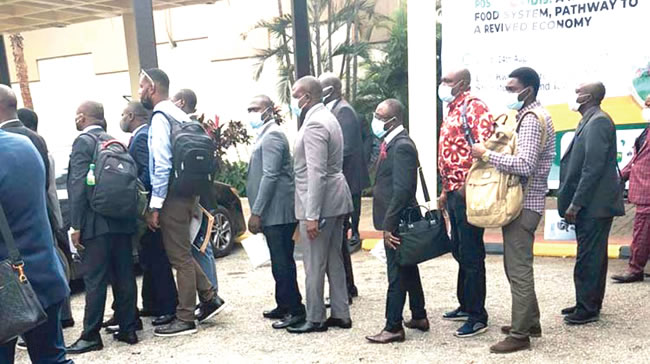The continuous emigration of skilled medical workers has worsened the already depleted health care sector in Nigeria. In this piece, YEJIDE GBENGA-OGUNDARE reports that stakeholders across various segments in the medical sector hold government solely responsible for the challenges, highlighting government’s insincerity, poor remuneration and insecurity as some of the factors pushing medical professionals out of the country.
Bankole (surname withheld) is a general practitioner in charge of a Primary Health care Centre that caters to about five rural communities with a population of over 5,000 people in Oyo State. Consequently, his workload and schedule give little time as he works with three other junior doctors at a clinic that is ill-equipped for the services it is expected to render. But he is not bothered and has stopped asking for better infrastructure or conditions of service.
At the inception of his dream five years ago, he was emphatic that as a Christian, he would not practise in a foreign, Islamic country. But now, the story has changed and he is ready to go to any country to practice as long as it takes him beyond the shores of Nigeria.
Bankole is not alone; the experience of Shehu Liberty, a lecturer at the University of Maiduguri, in an open letter on his Facebook wall to President Muhammadu Buhari, recently trended, drawing attention to the mass migration of medical personnel.
According to him, “I accidentally met over 200 young male and female medical doctors, including consultants in Hawthorn Hotel, Abuja, being interviewed by some Saudi Arabian officials to be employed to work in Saudi Arabia. I saw an Arab gentleman addressing a crowd at the lobby of the hotel, asking them loudly to come back tomorrow.
“I curiously asked a lady who appeared dejected and was waiting with a file in her hand what was happening. The lady told me that they were all medical doctors, who were in the hotel since 7.00 a.m. for an interview for employment, and that over 100 ‘had been successful.’ The rest were told to come tomorrow for the continuation of the interview.”
Sadly, a survey conducted by NOI Polls in partnership with Nigeria Health Watch, in May 2017, revealed that eight out of 10 medical doctors across junior, mid- and senior level roles in both public and private medical institutions in Nigeria are actively seeking work opportunities abroad.
This reality has been established by the National Association of Resident Doctors (NARD) in its numerous alarms that many doctors want to leave the country. The implication of this continuous emigration of medical personnel is dire as it affects both urban and rural areas.
Lack of data
While the reality of emigration of medical practitioners is an agreed fact, there is a dearth of data on actual figures of medical practitioners who have left the country. Expected registered agencies and stakeholders do not have data and are therefore unable to give actual figures of medical practitioners who have left for other countries.
The Medical Dental Council of Nigeria, (MDCN) and the Nigeria Medical Association (NMA) have no adequate record. However, statistics from the General Medical Council (GMC) UK, in July 2017, revealed that over 4,765 Nigerian doctors are working in the UK, a figure which translated to 1.7 per cent of UK’s medical workforce then and which has increased now.
It was also revealed that 100 doctors resigned from the employment of the University College Hospital (UCH), Ibadan, in 2017, while in the last two years, 800 doctors resigned from hospitals owned by the Lagos State Government. Rather than sit the West Africa College of Physicians examination, many Nigerian doctors registered to sit the foreign examinations such as PLAB for the UK, USMLE for the United States, MCCE for Canada, AMC for Australia and DHA for Dubai amongst others.
While there is a consensus that too many doctors and other health practitioners are migrating from the country, there is the belief that the current situation is just a tip of the iceberg as the situation will definitely worsen.
A medical doctor expressed the opinion that the opening of UK borders to commonwealth countries is a huge attraction, adding that Nigeria should be prepared to lose more of her medical practitioners to other countries, especially Saudi Arabia, which is just a stepping stone for many doctors in their bid to get into Europe.
FG’s hypocrisy, cause of frequent strike, brain drain – AMLSN
The Association of Medical Laboratory Scientists of Nigeria (AMLSN) has attributed the incessant industrial disputes in the health sector to the alleged insincerity of the Federal Government in addressing the grievances of health workers.
The national president of AMLSN, Professor James Damen, made this known after AMSLN’s 57th Annual Scientific Conference and Workshop, in Yenagoa, Bayelsa State, at the weekend.
He said the alleged hypocrisy of the government in addressing the concerns of medical workers was responsible for the repeated strike actions embarked upon by the Joint Health Sector Unions (JOHESU), Nigerian Medical Association (NMA), and the National Association of Resident Doctors (NARD), among others.
“It portrays the government in a bad light and that is giving health professionals reasons, by the day, to migrate out of the country for greener pasture elsewhere thus draining the country of skilled workforce in the health care sector,” he said.
What we have is no more a drain but hemorrhage – NMA
Speaking on the issue, Ayotunde Fasunla, the chairman of NMA, Oyo State branch, said what is happening is no longer a drain but has degenerated into a brain hemorrhage.
According to him, “When you are treated like a slave in your country and other countries want what you have, you will go there to have peace of mind, better remuneration, value and you are happy with your family. The way out is that government must be sincere and keep its promises. Government is solely responsible for this and government must be honest. Don’t continue deceiving them and entering agreements you don’t want to keep. You say there is no money but you spend lavishly on irrelevancies.
“There is no smoke without fire; there are reasons for medical personnel moving out of the country. To the best of my knowledge, the reasons are multilayered. When someone is trained to do a humanitarian job of healing and you have the knowledge but you don’t have what you need to do your job, it will affect your morale, enthusiasm and zeal. More often than not, when we see patients, we know what to do for them but we are handicapped because what we need is not readily available.
“How can you be earning a meager salary and you will still not get paid? Many of our colleagues have been appointed for months with no salary, only promises; is that what they will use to survive? Why won’t you go to a better place with better remuneration and timely payment? A senior professor in Nigeria gets N900, 000 while a junior professor gets N500, 000 but his counterpart in Saudi Arabia gets about six to seven million naira and they will treat you better. Won’t you go there especially with the common lack of promotion? Government must resolve issues with all aggrieved people and keep its promises.”
Former NMA president, Mike Ogirima, also stated that between 10,000 and 15,000 doctors, who were trained in Nigeria, currently work outside the country. He added that many Nigerian doctors are leaving the country due to inclement working environment. He therefore asked the government to improve the working environment, provide necessary tools for doctors and improve their welfare package.
We lack capacity to stop brain drain—FG
The Federal Government has, on its part, recently stated that it does not have the capacity to stop brain drain in the medical sector. The Minister of Health, Osagie Ehanire, stated that “it is actually difficult to say we want to combat the brain drain of doctors. They see the salaries in developed countries and most of them do not want to serve in rural areas.”
Enahire further defended the government for the poor remuneration of medical doctors and other health workers, stating that the professionals are not well-paid in other developing countries. He emphasised that “in Nigeria, we are not the only ones suffering from it. Some other developing countries also suffer (from) it too. Because they studied in English, they easily get into those countries. We are also working to make sure that working conditions in Nigeria are favourable. That is why we are also working on the issues of hazard allowances.”
Earlier, the Minister of State for Health, Dr Olorunnimbe Mamora, had stated that the Federal Government was worried over the brain drain in the health sector and “working assiduously to discourage physicians’ brain drain from the country.”
According to him, the Federal Government is also committed to building a healthy system that guarantees universal access to comprehensive, efficient, affordable, adequate, equitable, and quality health care for all Nigerians in order to discourage medical tourism.
Putting an end to brain drain
Experts, at the opening ceremony and scientific conference of the Association of Resident Doctors’ 2018 Annual Health Week, stated that to put an end to brain drain in the health sector, the Nigerian government must provide more funds, emoluments and incentives for medical practitioners while doctors are advised to participate more in politics in order to change policies affecting them.
The chairman of the Nigerian Medical Association (NMA), Abuja Branch, Ekpe Phillips, advised government to emulate the concept used by India to bring back their medical professionals who migrated to other countries, adding that “India was able to conquer brain drain because they offered an interest-free loan to all their medical professionals abroad. The loan was for them to establish whatever facility of their dream in their country. The government also provided incentives and conducive working condition and their doctors came home.”
At present, Nigeria is far from the World Health Organisation’s (WHO) recommendations of one physician to every 1,000 patients. Indeed, it is said that Nigeria has a physician-patient ratio of up to one to 5,000. The gross inadequacies in the Nigerian health system with low levels of work satisfaction and poor salaries and emoluments have been highlighted as the major reason for brain drain.
This makes it critical for government to put in place urgent policies and strategies as part of the overall recovery plan to mitigate the unprecedented medical brain drain and its effects on an already fragile health sector as there exists the likelihood of torrential exit of doctors and other health workers from Nigeria to more developed nations.
YOU SHOULD NOT MISS THESE HEADLINES FROM NIGERIAN TRIBUNE
We Have Not Had Water Supply In Months ― Abeokuta Residents
In spite of the huge investment in the water sector by the government and international organisations, water scarcity has grown to become a perennial nightmare for residents of Abeokuta, the Ogun State capital. This report x-rays the lives and experiences of residents in getting clean, potable and affordable water amidst the surge of COVID-19 cases in the state…
Selfies, video calls and Chinese documentaries: The things you’ll meet onboard Lagos-Ibadan train
The Lagos-Ibadan railway was inaugurated recently for a full paid operation by the Nigerian Railway Corporation after about a year of free test-run. Our reporter joined the train to and fro Lagos from Ibadan and tells his experience in this report…





